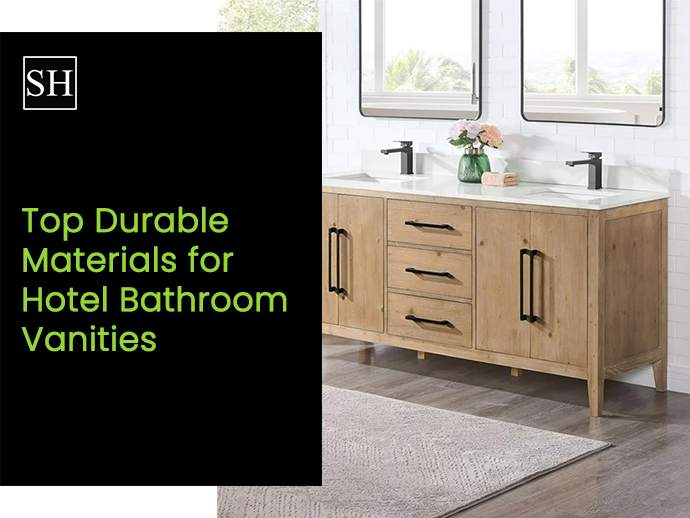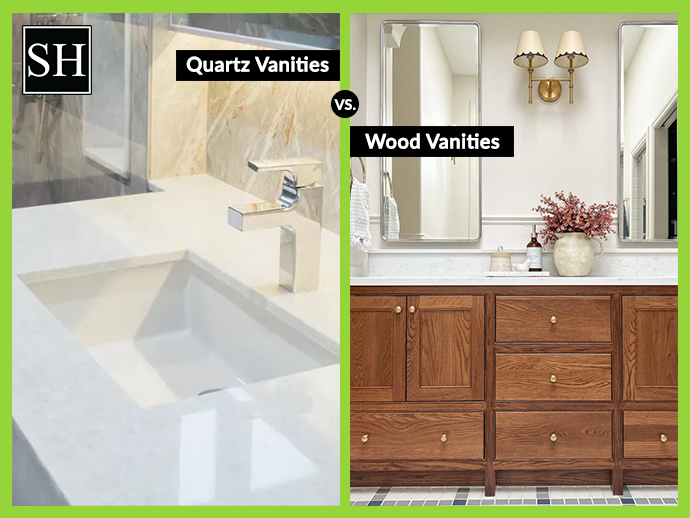
Quartz vs. Wood Vanities: Combining Modern Luxury with Natural Warmth
First impressions are ordinarily formed when you walk into a hotel bathroom, and the vanity takes centre stage. As a hotel owner, your goal is to balance the dual appeal of contemporary design and warm natural accents. Thus, in the debate of quartz bathroom vanities vs. wood bathroom vanities for hotels, I encourage you to think critically about what truly serves you best.
Why Your Hotel Vanity Choice Matters More Than You Think
In my experience, vanities impact a hotel's reputation considerably due to:
- Guest First Impressions: A sense of elegance is always attached to a pristine, well-maintained vanity. It speaks to attention to detail. Unfortunately, the same cannot be said for a battered or impractical option.
- Maintenance Ease: Strategically located cosmetics and toiletries simplify cleaning and organisation, effectively optimising time spent on housekeeping, which minimises overall hotel expenditures.
- Brand Reflection: Whether your goal is to exude an ultra-modern, cosy-chic vibe or anything in between, the style of your vanities significantly impacts your overall brand image for the duration.
Upgrade your guest experience with the right bathroom finishes. Discover the most durable materials for hotel bathroom vanities now.
The Reasoning Behind Choosing Quartz: Luxury and Its Accessibility
.webp)
Quartz is not a stone that can be fetched from the ground in one piece; rather, it is an engineered marvel. Typically, it is around 90 – 95% ground natural quartz combined with resins and pigments. Such quartz is highly beneficial, especially in the hospitality industry.
Pros – Why Quartz Often Wins for Hotels:
- Sleek, Modern Sophistication: Quartz offers immaculate lines and a consistent, dazzling finish, mostly quartz-infused, perfect for creating luxury quartz bathtubs.
- Rough and Tough: This has to do with its strength. Quartz is exceptionally tough compared to most materials and is highly resistant to scratches, chips, and stains. That's helpful in a hotel setting.
- Non-Porous Champion: This is one of the most striking advantages of quartz. It is liquid resistant as far as absorption goes, which means it won't breed bacteria or get stained by spills. The best part is that sealing is not required at all.
- Consistent Appearance: Uniformity across varied rooms, quartz achieves that without complications, unlike its competitors.
- Low-Maintenance Dream: They can usually only be wiped to keep their appearance pristine.
Cons – Things to Keep in Mind:
- Less Organic Appeal: Naturalists might mourn for the absence of unique grain patterns in natural wood, which is sometimes delicate and beautiful in its randomness.
- Upfront Cost: Certain wood materials for countertops are less expensive, while quartz options are relatively more costly.
- Extreme Heat Sensitivity: Countertops are mostly heat resistant; however, contact with extreme heat, such as an unattended curling iron, can cause damages over time.
The Allure of Wood: Natural Warmth and Timeless Appeal
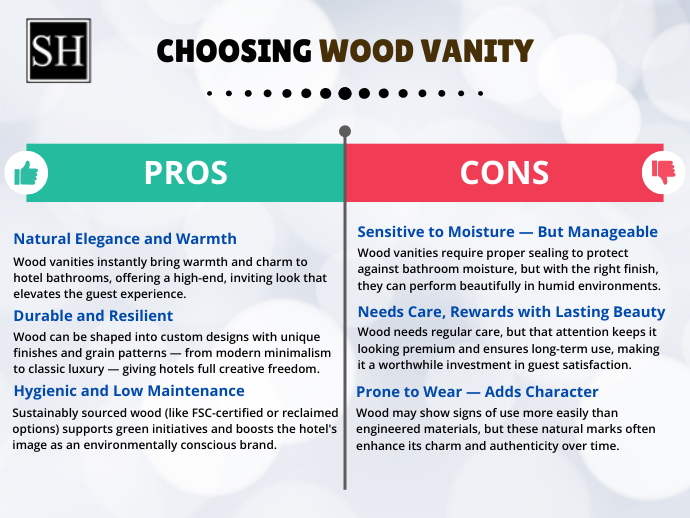
A wooden decor has an everlasting appeal. Whether solid or veneer, wood provides unmatched warmth and can instantly enhance the aesthetic of a given space.
Pros: Endless benefits
- Unmistakable warmth: Wood adds tactile and visual warmth to a space, which is usually absent in engineered materials.
- Style Versatility: It can achieve remarkable bespoke wood vanities in custom shapes, coupled with distinct grains and finishes ranging from traditional elegant to rustic farmhouse.
- Sustainability story: Provided the wood is sourced responsibly using FSC-certified and reclaimed wood, it goes a long way in improving the image of your hotel as a provider of sustainably sourced hotel vanities.
Cons: The Practical Challenges
- Water is the Enemy: This is the big one. The bathroom environment can lead to warping, swelling, rot, and mildew on wood if it isn’t impeccably sealed and maintained, due to moisture exposure and splashes.
- Higher Maintenance Demands: In addition to routine scrubbing, wood has to be checked for scratches, any water ingress, and its sealant checked, all of which consumes too much time for the busy housekeeping staff.
- Durability Concerns: Generally, it’s also easier to get scratches, dents, and general wear and tear compared to quartz, especially in a high-turnover hotel room.
Wood vs. Quartz Hotel Vanities: A Head-to-Head for Hospitality
Let's put these two side-by-side, looking at what matters for a hotel when considering wood vs. quartz hotel vanities:
|
Feature |
Quartz Vanities |
Wood Vanities (Solid/Veneer Tops & Bases) |
|
Durability |
Excellent (Scratch, stain, chip resistant) |
Fair to Good (Prone to water damage, scratches) |
|
Maintenance |
Very Low (Non-porous, no sealing) |
High (Requires sealing, careful cleaning) |
|
Water Resistance |
Excellent |
Poor to Fair (Highly dependent on sealing) |
|
Aesthetics |
Modern, sleek, consistent, wide color range |
Warm, natural, unique grains, versatile styles |
|
Hygiene |
Excellent (Non-porous, resists bacteria) |
Fair (Can harbor mold/mildew if seal fails) |
|
Cost (Initial) |
Mid to High |
Varies widely (Low for basic, high for custom) |
|
Sustainability |
Long-lasting; some use recycled content. |
Good if responsibly sourced (FSC, reclaimed). |
For most hotel applications where durability and low maintenance are paramount, quartz often has the edge.
The Hybrid Approach: Best of Both Worlds?
What if you need the durability of quartz and the warmth of wood? Many hotels have already come to a clever compromise:
- Wood Base, Quartz Top: Bring the warm, natural wood aesthetic into the room with a vanity cabinet or base, then top it with a durable, non-porous quartz countertop. This provides the elegance of wood without soaking it with water and toiletries from the main work surface. We at Sara Hospitality USA frequently assist clients with custom hospitality furniture designs.
With this hybrid approach, you get the aesthetic beauty of both materials and the assurance that the high-contact surface will be ultra-durable and easy to maintain.
Sustainable choices: quartz, wood, and your hotel's eco footprint
The discussion surrounding sustainable hotel vanities is becoming more relevant by the day.
- Quartz: It is one of the most sustainable materials available. Its incredible durability allows for a longer life span, which reduces the need for replacement. Some manufacturers incorporate recycled glass or other materials into their quartz slabs and use more eco-friendly production processes.
- Wood: The most eco-friendly option is having responsibly sourced wood. Find FSC certification, as it guarantees the wood is harvested from well-maintained forests. For eco-friendly custom wood vanities, reclaimed wood is superb.
As seen, the most sustainable option is the one that performs best, as it will minimise upkeep, resources required, and waste.
How to make the right decision for your property
So, who emerges victorious in the quartz vs. wood bathroom vanities debate for your hotel?
- Lean towards Quartz if: your highest priorities are tremendous durability, very little maintenance, consistent modern aesthetic, especially for luxury quartz bathroom vanities, and the highest levels of hygiene practised in many rooms.
- Consider Wood (or a Hybrid) if: the goal is to achieve a specific warm, natural, or rustic look, perhaps in a boutique space, and is fine with some wood bases maintaining higher, more frequent upkeep paired with quartz tops. If using all wood, ensure it is exceptionally well sealed for a moist environment and can be maintained by the team's housekeeping.
Your typical guest, brand, operational ability, and budget – initial purchase and peg spending over time should all be considered.
Conclusion
The selection of quartz or wood for hotel bathroom vanities is more than just materials; it is about balancing aesthetic wishes against practical needs. While we cannot overlook the beauty of wood, its warmth, and the gruelling expectations of wood in hotel environments, Quartz's sheer durability, low maintenance, and hygienic properties make it a powerful contender. In this case, the hybrid approach offers a fantastic compromise. No matter the path you take, ensure it improves the guest experience, assists staff efforts, and is reasonably durable.
- SOFT SEATING
- BATHROOM VANITY
- FIXTURE EQUIPMENT
- Hospitality Casegoods
- Hospitality outdoor furniture
- Senior living furniture
- Hotel reception desk
- High end contract furniture
- Premium Hotel Bedroom Furniture
- Custom commercial furniture
- Hospitality Furniture Manufacturers in Canada
- Leading Hotel Furniture Manufacturers in Canada
- Casegood manufacture canada
- Hotel Casegoods
CATEGORIES
FREQUENTLY ASKED QUESTIONS
RELATED BLOGS

The Ultimate Guide to Bathroom Vanities 2026
Sara Hospitality | Feb 05, 2026
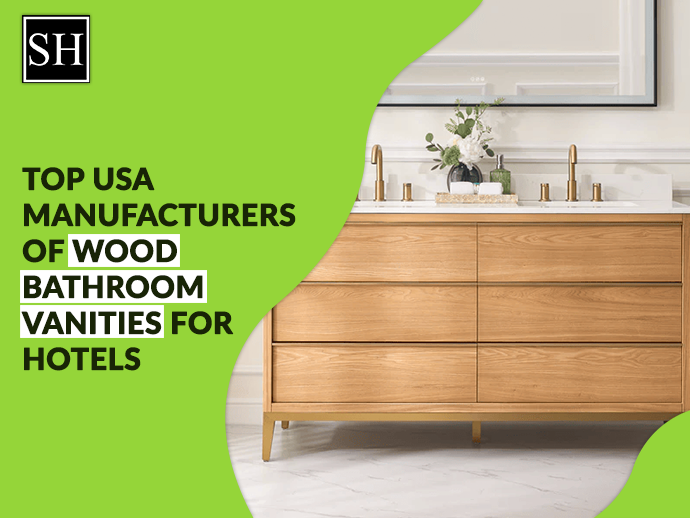
Top USA Manufacturers of Wood Bathroom Vanities for Hotels
John Smith | Jan 22, 2026
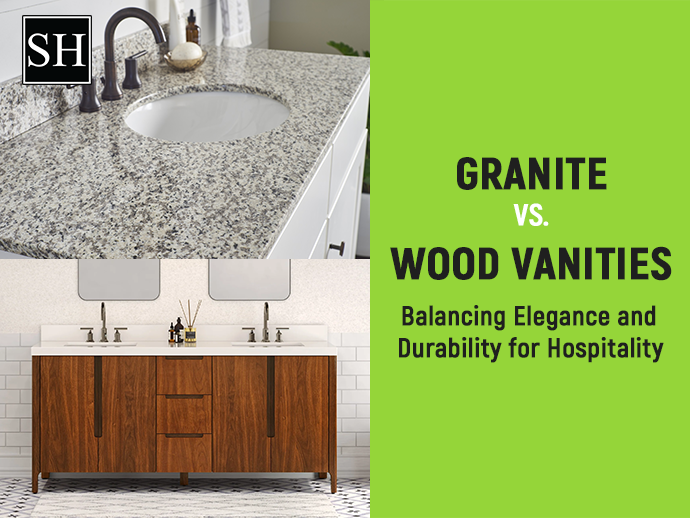
Granite vs. Wood Vanities: Balancing Elegance and Durability for Hospitality
Sara Hospitality | Jan 12, 2026
